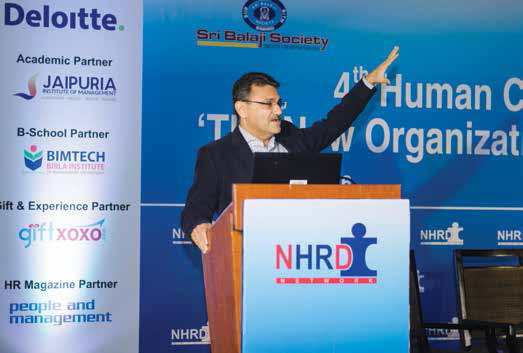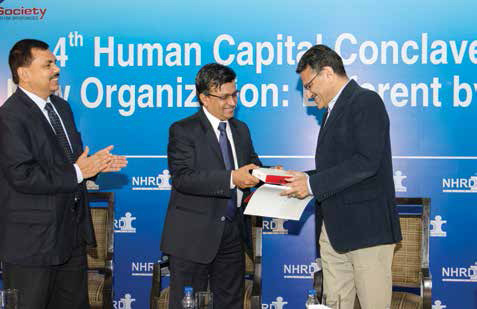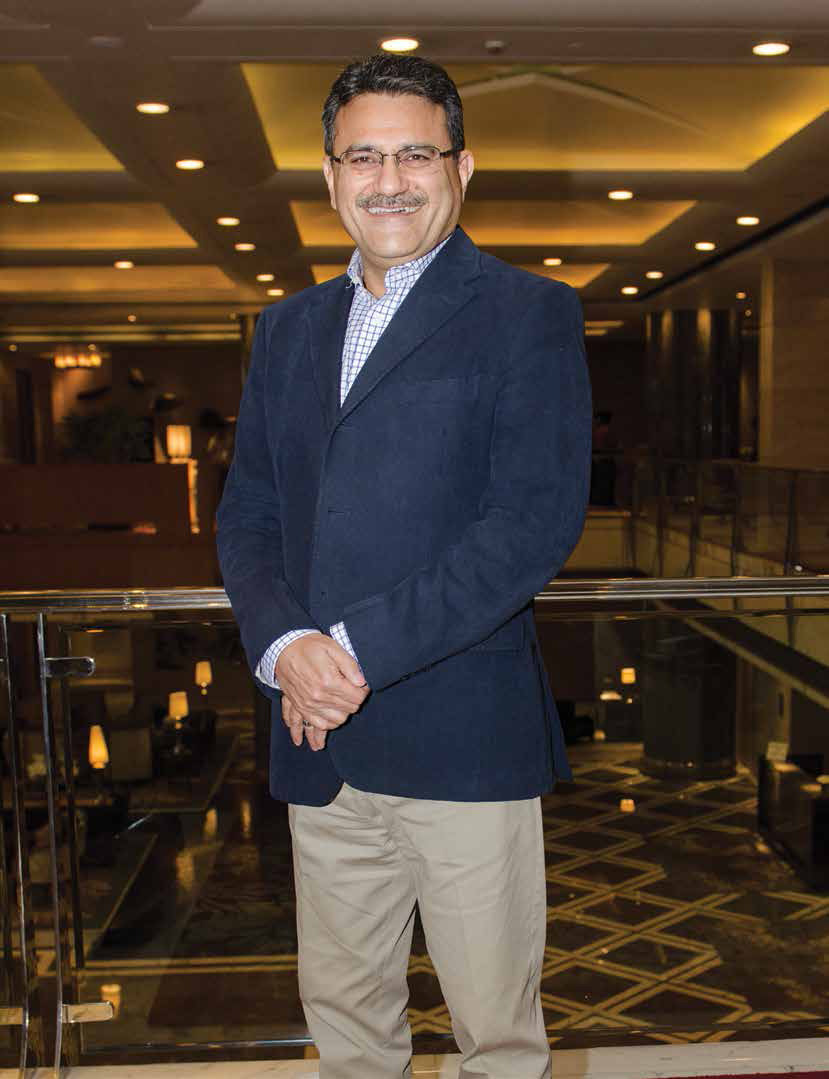
Change has always been a constant in the business world. Yet, in the last couple of years, it has hit business leaders with such an unprecedented speed and intensity that not many understand how they can adapt to these sweeping changes trying to redefine their workplace. How can they deploy them to their advantage? How could India’s top CEOs redesign their institutions and fix their priorities in keeping with today’s digital world which is changing faster than ever before? To get some insights into the global forces unleashing a series of drivers coming together to create disruptive changes in the world of business, NHRD Network invited one of its founder members, Manoj Kohli, Executive Chairman of the SB Cleantech, to share his personal perspectives on why overcoming resistance to change is necessary for our CEOs and HR professionals and what is the new look of the future organisations. Corporate Citizen brings to you excerpts of this highly persuasive speech, offering some hard-hitting ideas and advice to HR leaders present at the fourth Human Capital Conclave held in Gurgaon recently
Before I talk about the changing Nature of Organisations, Work and Workplace, I want to thank my NHRDN-Deloitte friends for bringing out an excellent report on Global Human Capital Trends 2016. It is very topical and very important but I don’t think that it is fully understood because it presents a harsh reality which lot of people will not like to see.

The world is completely changing from what it was last year and I’m not talking about 1966. I’m talking about last year. China, which was a big thing last year, is today slowing down dramatically. Stories of China’s economic growth used to make big headlines in the last decade but, in 2015, its economic growth was the slowest in the last 25 years. Similarly, the Middle East is going through a huge catharsis where the oil prices went down to $ 26-27 and now it’s coming back to $49-50 from $120 where it used to be fairly stable till mid-2014. But, since then, there has been a free fall in global oil prices. So, can you imagine, what will happen if $70-80 go away from Middle-East and come into the pockets of Indians, come into the pockets of Chinese? Naturally, lower oil prices had hit the economies of the Middle East countries severely and so it was not surprising that they too experienced a major slow-down in 2015. It obviously brought a huge change in their spending. While European economies are all battling for the last few years, the US is also struggling since last year. It is trying to grow but not growing as well as it wants to. And, as you heard it correctly, it looks Trump is coming. But in this otherwise gloomy scenario, India is doing very well. We can say with pride that for a change, India is growing faster than the world. The Narendra Modi government is very, very determined to make it even faster in the coming years.
But before I proceed further, tell me, do you agree with this world view? (A resounding ‘yes’ comes from the audience)… Okay.
Now, based on this world view, let me tell you, how are companies and corporations going to change? Lot of companies are struggling. Your report on global human capital trends 2016 said 82 percent of companies are restructuring. Is that right? That means 82 percent companies are kind of struggling. Actually, the balance 18 percent of the companies are also struggling but they’re sleeping. (There is huge laughter in the audience).
So, 100 percent of companies are struggling. There are very few companies that are not struggling. By struggling, I mean, the profits are down, the costs are high, the revenues are dropping, and there is immense competition, cut-throat competition in the market. And, they don’t know what all to do? They don’t know how to prioritise their work? There are very few companies that are prioritising their jobs correctly.
Generally companies try to do too many things, and fail. But they should do few things only and do them very well and according to their priorities. They should do only the top three or four things and not more than that. If they do that, then I think they will be safe.
But I think managements are under pressure. The Boards are becoming mercenaries. So, it’s becoming increasingly tough.
There are concurrent transformations going on. Lots of business transformations going on. But that is not all. The concurrent business model changes are also going on and they are leading to huge social catharsis and people catharsis because of one word which your report rightly identified as Reactive. Yes, it’s all Reactive. And, because of it being reactive, people are facing the brunt. There are people who are on the roads. People who were earning very well till today may not be earning well tomorrow. People feel that their skills are of no use now because they’re so unskilled. I mean they are MBAs and they’re all highly educated but they’re all unskilled because they haven’t kept pace with the change. So, that is where we are today. And, I fully agree here with your report that the year 2016 is a year of monumental changes and challenges.
Generally companies try to do too many things, and fail. But they should do few things only and do them very well and according to their priorities. They should do only the top three or four things and not more than that. If they do that, then I think they will be safe
That is the character of today’s global change and India change. And, for a change, India has to change along with the world. Till a couple of years ago, I used to represent the telecom industry in India, which, I think, was about 4-5 years behind the world. The 4G in India, I think, is 4-5 years behind the world but now I’ve entered into an industry, which is energy industry, solar energy industry, where India is on par with the world. My company SB Cleantech is building the fourth largest solar plant in the world which means we’re actually on par with the world in terms of clean and green energy.
So, clearly, India, which was decades behind the world, is now at par with the world. Therefore, the transformation in India, the catharsis of India will also be as good or as bad as that of the world.

Now, let me give you some bad news. The bad news is that though a vast and varied series of transformational changes are taking place all around us, our organisations are not changing. Actually, organisations don’t change. It is only the environment which is changing. Everything is changing but we don’t change.
Let me take you back into 1979 when I started my career 37 years back in Daurala Sugar Mills near Meerut, as a management trainee in the DCM Shriram Group. I don’t know if anyone of you had ever heard about Daurala Sugars because most people have gone sugar-free these days!
At that time, it was perhaps the largest and also the best sugar plant of the country in terms of profitability and quality but it was completely manual. Now, this was not 1966. This was 1979. So even in 1979, we were completely manual. I was writing registers. My first job was in the attendance and pay-office and it was completely manual.
And, my second job, after two weeks, was on the way-bridge. You know ganna or sugarcane used to come in buggies. I don’t know if you’ve been to any sugar mill, but if you’ve been to any such, you would know that lot of sugarcane come every day on buggies, and there are two way bridges. I was a way-bridge clerk for one of the two but it was again a completely manual job. So, there was poor productivity and huge investment on manpower in Daurala. Everything was company-driven at every level and they used to give permanent appointments to staffers. It was a static world. That this was how Lala Shri Ram had built Daurala Sugar Mills was understandable but would it continue functioning like this forever? Are you getting me?
This was the concept with which it started about 100 years back and this is supposedly among the best one even today and hence, it seems, we never like to change. So, this was where I started my career and I was a bit amazed that why is everything static over there even now in 2016?
Okay, let me now cut to today. My last experience was to lead the Bharti Airtel for 15 years. From ground zero we built a company which was the fourth largest company in the word, having 350 million customers in 20 countries and a new business model which the entire telecom world copied.
Companies won’t sleep because companies are across boundaries, across time-zones and therefore companies will never sleep. They will be always on. The future will be dependent on social skills and technological competence
Incidentally, outsourcing did not start in India with Airtel. It started with Bharti Airtel in 2002. I remember we started this and we said let’s do something fresh, something new, something no one in the world has ever done and so we gave the entire network of Bharti Airtel to Ericsson and Nokia to run because they were better than us. We gave the entire IT operations to IBM to run because they were better than us. We gave the entire call centre jobs to 4-5 big BPLs to run because they were better than us. We did all that. On our part, we did only those jobs which concerned with maintaining government relations and branding. No wonder, Airtel is number 1 today in the country. We did something that we thought we knew. We did the job of motivating our people. We did people engagement because we thought we knew it. So, we only did 4-5 things and the rest of everything was done by others but, of course, under our supervision.
So, this was the organisation design we created and which was a breakthrough. We had found it in 2002 and we’d deployed it. There were a lot of people who felt we were going crazy. For example, the Singapore Telecom guys were a bit worried as they repeatedly asked us: ‘Why are you doing it? You will fail.’
But we used to tell them: ‘See, we’re a loss-making, small company, we may fail in doing so. But you pretty well know that we’re already kind of going down in the market. We can’t fail any more. So, let’s see, how it goes. We therefore tried with this model and we succeeded.
Authority will be decentralised in future. Fast moving global markets and digital disruptions will force companies to restructure and move towards product and customer-centric organisations
But that is today. That is not tomorrow. I don’t think Bharti Airtel is tomorrow. Bharti Airtel has to change dramatically if it has to sustain in future. But then, the question is: What is future?
Future is very, very different and I think your India Human Capital Trends 2016 showed some colours of the future in your report. I’ll tell you what I’m doing now and I think there is some colour of the future over there.
We are currently building in Andhra Pradesh the fourth largest solar energy plant of the world in India. Just as the Bharti Airtel was the third largest in the world; here in the field of providing clean energy; this plant will be the largest. And, we’re planning to build 20,000 Megawatt of solar energy in India. We’re building the fourth largest solar power plant in Andhra Pradesh and today we are just 27 people doing it! All of them are very, very young. Actually, I’m double their average age. I think by next year maybe we’ll build the largest plant in the world and then every year, we’ll build lot of solar plants in other parts of the country. But we don’t think that the strength of our team may not go to even triple digits.
We will have rock solid partners across the world that will support us in executing all these projects, in technology, in Observations & Measurements (O&M) but we’ll be a small intellectual team which will run this largest solar company in the world.
An inspiring speaker on the ever-changing landscape of business-driven learning, HR and talent management, Manoj Kohli is the Executive Chairman of the SB Cleantech. A joint venture of three global corporate giants-- Japan’s telecom and internet major SoftBank, leading Indian business conglomerate Bharti Enterprises and Taiwan-based top design and manufacturing services provider Foxconn -- SB Cleantech is presently busy taking steps to realize its $20 billion commitment to promote Prime Minister Narendra Modi’s campaign for generating clean, green and safe energy in India over the next over 10 years. Currently, it is working on a 350 megawatt solar power project in the Ghani Sakunala Solar Park in Kurnool district of Andhra Pradesh. SoftBank has majority stakes in this project, while Bharti and Foxconn have minority stakes. The venture plans to bid for other solar and wind energy projects across key states of India which has a $250 billion investment opportunity in the renewable energy sector, says Union Power Minister, Piyush Goyal.
The design is led by the basic concept of highest productivity in the company. The design is led by the fundamental concept that inside the company, we will only lead and supervise. We will do only those things that we need to do. Anything where somebody else has better domain knowledge than us will be done by that company. It is all about domain knowledge. It is all about deep knowledge. It is not about anything else. We will automate the company, end to end.
Future of the new organisation has to be very highly productive, very highly automated and very highly engaged. I feel that there are two-three aspects that will bring about very big changes and which all of you must note so as to lead in your own organisations.
Number one: The individual will be very, very empowered in future. I think we have had it in the past that out of 10,000 people in a company, 9,900 are not empowered and it is not an exaggeration. There used to be only about 100 or 50 people who were really empowered but that kind of scenario will be completely out of place in future.
Future will be only about empowered employees. Employees who are educated, who have knowledge and leaders who are fully empowered to do whatever they want to do under them.
Authority will be decentralised in future. Fast moving global markets and digital disruptions will force companies to restructure and move towards product and customer-centric organisations and form dynamic networks of highly empowered teams that communicate and coordinate activities in unique and powerful ways.
Second thing is, teams will be online – morning, evening, night. All teams within an organization will be online 24x7 because everything will be done by teams. All tasks will be team-based and collaborative because It can’t be done by one person. Hence automation and online engagement will continue round the clock and Culture (which is the system of values, beliefs and behaviours that shape how real work gets done within an organization) will be always on.
Companies won’t sleep because companies are across boundaries, across time-zones and therefore companies will never sleep. They will be always on. Hence all the rules, regulations and everything else will be done for those kinds of things and situations. Future will be more dependent on social skills and technological competence and more mobile and less dependent on geography.
I feel, there should have been lots of CEOs sitting here in this room as ultimately they have to lead this change because HR people will find it difficult to do so. I’m sorry to say that HR guys are very good but CEOs still are more powerful.
By G Udayakumar